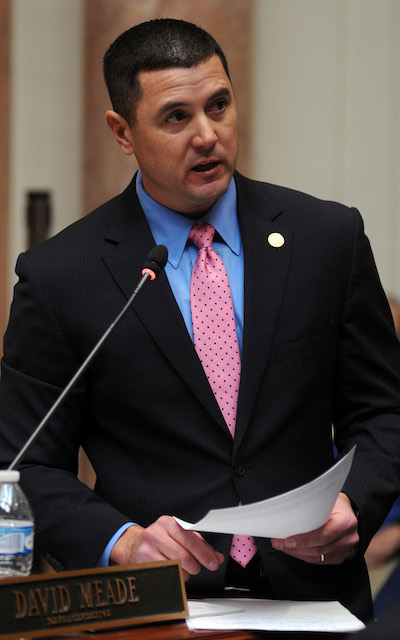Public assistance reform in HB 1 advances to full chamber

FRANKFORT—A House initiative to reform how Kentucky provides low-income cash assistance, food assistance, and certain Medicaid benefits to its citizens passed the chamber today by a vote of 58-32.
House Speaker Pro Tempore David Meade, R-Stanford, said House Bill 1, as amended on the House floor today, would remove barriers to public assistance by those who need it most while holding those who may abuse the system accountable. Meade and House Speaker David Osborne, R-Prospect, are primary cosponsors of the measure.
“I would say that if we save one life from drug addiction, or we make sure one child does not go hungry because their parents are trafficking (their benefits) card, then it’s well worth the cost that we’ve spent,” Meade told his colleagues in the House.
Key reforms that the state would be required to implement under House Bill 1 would: require most cash assistance beneficiaries to use one single electronic benefit transfer (EBT) card for all programs with penalties for selling or otherwise misusing the card; provide “transitional” benefits through SNAP—the federal Supplemental Nutrition Assistance Program formerly known as food stamps, and; allow implementation of a Medicaid work requirement should state matching funds required to cover Kentucky’s expanded Medicaid population reach a certain level.
Those with earnings between 138-200 percent of the federal poverty level who no longer qualify for Medicaid because of increased income, but who otherwise qualify for Medicaid, could participate in a state health insurance option under HB 1. The program would provide the optional insurance to a qualified individual for 12 months or longer.
Some lawmakers opposing the legislation said it could potentially cost the state more that it would save. House Minority Whip Angie Hatton, D-Whitesburg, said fraud and “perceived fraud” among public cash assistance beneficiaries in Kentucky is estimated to cost taxpayers less than $400,000 a year at most. The impact of HB 1 would cost more than 50 times that amount, she estimated.
“We’ll spend $20 million to ferret this out,” she said. “And why? … The reasons are that we want to encourage people to work. Well, statistics show us that 62 percent of people who are on Medicaid are working compared to the general public’s percentage which is 58 percent.”
Meade said most of the money to pay for the initiative would be federal, not state. He also countered some legislators’ comments that HB 1 would hurt low-income families and individuals by saying the legislation would “drastically” increase benefits while helping individuals become more self-sufficient.
“Only those who lose these benefits can do so in two ways—they are either fraudulently misusing the card, the benefits that they’ve been given, or they are a completely able-bodied adult with no dependents and simply choose not to participate in a community engagement program,” said Meade.
HB 1 would also require the Cabinet for Health and Family Services to report to the state Public Assistance Oversight and Advisory Committee regarding possible changes to childcare assistance programs, and propose a legislative work group to review and report to the General Assembly on state substance abuse recovery efforts.
The bill now goes to the Senate for consideration.













![Foothills-Bundle] Foothills-Bundle](https://thelevisalazer.com/wp-content/uploads/2020/05/Foothills-Bundle-422x74.jpg)





the easy fix the Medicaid problem would be pay higher wages stop subsidize these big corporations for not paying higher wages if 62% of the people on medicaid are already working MORE UNION JOBS DO AWAY WITH THE RIGHT TO WORK LAWS